I have been looking forward to Darkest Hour since it was first announced. If you follow Gary Oldman’s career as I do, you gather that the man seems to enjoy working more than he feels energized to gun for awards (see his recent films, Criminal and Hitman’s Bodyguard), so I was jazzed by the fact that this would be not only a serious leading role for Oldman, obviously, but also that Darkest Hour was to be helmed by an auteur. Director Joe Wright is known for his visually arresting filmmaking and has worked the awards circuit for over a decade thanks to his period pieces like Atonement and Anna Karenina. One glance at his filmography may remind us that Wright has a flair for the theatrical (and also the Keira Knightley, who, strangely, is nowhere to be found in DH), his pieces ooze with atmosphere and flirt with Sirkian melodrama (he also directed Pan, but we don’t talk about that). It was reassuring to think that a popular subject like Churchill would be in the hands of someone who might be capable of resurrecting him with the same liveliness and change of perspective that Wright brought to Pride & Prejudice (yeah I love that adaptation, come at me).

- Darkest Hour’s ranking on the Oldometer: 8/10
- Gary Oldman character quality: Gary plays the iconic historical figure Winston Churchill, so obviously there’s alot goin’ on there. While the remarkable makeup deserves some recognition, Oldman gives his best performance here since Tinker Tailor Soldier Spy, and he’s gonna get the Oscar. [Edit: he did!]
- Does Gary die in this one? No.
Ironically for a story about such a big man, it’s the “littleness” that counts in this story, an approach that Wright has taken to heart on several levels. First, the scope of the story is kept very small, which seems to be a particularly challenging feat for a biopic. Too many movies about famous figures make the mistake of chronicling their protagonists from birth to death (or at least until their most notable life event), which cause these films to suffer from lack of focus and rushing to cover too many important events. These movies tend to get muddled when it comes to picking what they would like to say about their subject (I’m looking at you, Martin Scorsese’s The Aviator). In Darkest Hour, Wright wisely chooses to specifically depict the first two fraught months of Churchill’s career as prime minister. Even the film’s title is restricted to a specific allotment of time.
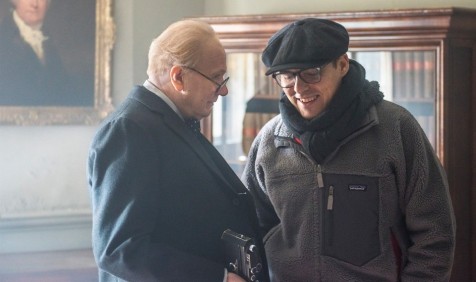
I may have quickly taken to this approach to storytelling as I myself have been feeling… small lately. Small in the face of injustice, small in the midst of family dynamics, small in the presence of peers who are doing big things with their lives. About two months ago I turned 30, and all I wanted to do was burrow under my comforter and sleep for an age in order to forget how deeply disappointing I find my life. I would hesitate to ever call myself a happy person, however, I feel at my best when I know I am working towards something worthwhile. External complications and undeniable personal failings have led me to where I am at present, which looks alot like… nowhere. It’s as though I’ve been on the express train to Somewhere for the past few years, only to be dropped off in the middle of No Place and told to find a way to my destination. I might actually be closer than I know to said destination, but currently there’s no telling, just the knowledge that I have to keep trying to figure it out because that’s life for you. That’s a hard enough pill to swallow, but when you realize you have stumbled across a milestone (in my case, age 30) and have to acknowledge that, coincidentally or not, you are simply not doing very well, it is doubly painful. Forgive me my privileged middle class American white girl angst, but accepting insignificance, even for a short time, is a deeply humbling experience, one that I currently refer to as “littleness.” But more on that in a sec.

Upon close attention, one may observe that Wright’s restrained, interior storytelling is applied to many aspects of Darkest Hour, including its scene by scene structure. The majority of individual scenes are coaxed into life by virtue of their smallness; the film is a mosaic of intimate moments. Some exchanges play like they were made for the stage, as Churchill and other characters discuss what on earth they are going to do with the weighty task that has been handed to them. Other scenes are craftily cinematic, noticing the tics and beads of sweat and wet eyes of its subjects. Wright also elaborates on “littleness” thematically, shooting his characters in constricting, occasionally even cramped spaces (Churchill’s bedroom, an elevator, the tube). This is especially effective when the focus is on Churchill, an imposing man in more ways than one, who is crammed into these spaces to represent his growing sense of claustrophobia; the feeling that he is cut off from viable choices, that he is unable to win.
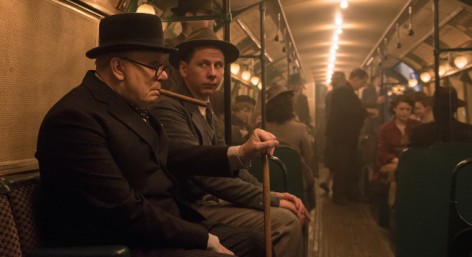
While it clearly concentrates on one man, Darkest Hour also makes an effort to instill this same sense of being backed into a corner with its supporting characters, such as Churchill’s tireless wife, his faithful secretary, and even his detractors. In fact, Wright and his screenwriter make a point to legitimize (if not sympathize with) Churchill’s political antagonists who fret that Churchill is a loose cannon who may destroy England’s only hope for survival. These rivals rightfully discuss their fears about their opponent’s inadequacy and their concern that their country may never enjoy peace again. While it is essential that a film’s audience understand the graveness of a protagonist’s quest, Darkest Hour walks the tightwire of rooting for Churchill’s success and begrudgingly admitting that such success is unlikely given our main character’s flaws. The prime minister is ill-mannered, self-centered, alcoholic, stressed out, and depressed. He’s also… disarmingly human. One might even say “little.”
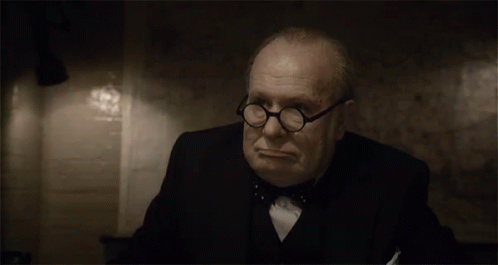
My favorite scene from DH, and maybe from any film of 2017 (though admittedly it was a great year for film all-around), is when Churchill, alone in a telephone booth room, gets FDR on the phone. At this time the US had not yet committed itself to participating in WWII, and thus the UK, embodied in this cinematic moment by a lone Churchill, found itself trying to hold back the tide of evil lapping up on its shore. Crackling over the wire, FDR’s voice is sympathetic but increasingly distant to Churchill, who grows visibly desperate in his frustrated pleas to the US president. When the most minuscule of aid is finally offered, Churchill can’t help but drearily laugh at its uselessness, and when the ultimately unhelpful FDR mentions it must be getting late over there in UK-land, Churchill solemnly agrees. “Even later than you know,” he says in despair. After a curt farewell, the prime minister, damp with sweat, hangs up his long distance receiver and sits alone, visibly suffocating under the burden of his country’s needs. Winston’s request for help may have fallen on deaf ears, but it was not the bombastic demand for support that one might expect from someone with a reputation for theatrics. It was quiet and sincere, and it didn’t work.

While I admire England’s survival tactics during WWII, I do not know the first thing about wartime strategy, but I do understand that war is waged by individuals who decide the fate of many. Joe Wright cannot pass up a chance to showcase Gary-as-Winston in full Great Orator mode (nor should he), but the director smartly depicts war as a series of discussions, of wrestling with the weight of potentially devastating choices, of sitting alone with your burdens (or hiding under the covers in response to your weakness in the face of said burdens). The war, and most likely Churchill’s time in office, was made up of far more of these intensely quiet moments than of the confident, articulate demonstrations of strength and unity.
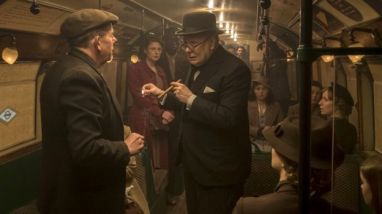
After King George, whom I took to be symbolic of Britain itself, makes a gesture of trust and partnership towards his prime minister when Churchill is at his most discouraged (a scene which I found particularly touching in a non-pandering sort of way), and following a scene on the Tube in which he asks citizens about how they feel about standing up to the Third Reich (a scene which I found touching in a pandering, historically incorrect sort of way), Churchill summons enough energy to deliver his famous speech to the House of Commons. Considering the anxiety that has brought the orator to this defining moment, one may suspect that Churchill is trying to convince himself, an overwhelmed man backed into a corner, that there is fight left. This is the “We shall fight them on the beaches… we shall never surrender” speech, meant to rally support for his stance, and it works beautifully on British citizens, the House of Commons, and the orator who delivers it.
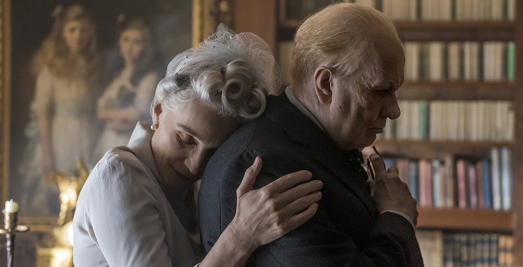
We are equipped with the knowledge that Winston Churchill was a complex, difficult person– viciously intelligent and a brilliant speaker. He was also just not a good guy. I’m not a historian, nor have I even read a single biography on the dude, but I am aware enough of Churchill’s reputation to know that he 1) was infamously condescending to women 2) was most definitely racist and particularly cruel to the Indian population (whom he called “beasts” and refused to assist in times of famine) 3) reportedly supported eugenics at some point in time. Given that information, it’s uncomfortable that Darkest Hour is as taken with Churchill as it is, however, that does not lessen the film’s message. Rather than glorifying or making warm and fuzzy an important yet morally compromised individual, Wright & Oldman are more interested in offering the portrait of a man who must rise to an occasion. Of course, this does make him lovable and cuddly at times, so I can accept the argument that the movie dabbles in the glamorizing of historical figures that do not deserve to be viewed as more legendary than they already are. Still, I can’t help but view the artistic choices of this film as humanizing rather than idolizing. It is easy to worship an icon, just as it is to vilify; I think the best goal for any biopic is to help its audience understand that the pieces of any one person’s life add up to just that: one person. For all of his skill in “weaponizing the English language” (my favorite quote from the film) and his conviction to stand strong at a particularly pivotal time, Churchill was a flawed man, and that is a strangely comforting reality.

It goes without saying that I will never have to shoulder the responsibility for a country (the heck, you say), so I’m not about to imply that I can relate to the suffering and wringing of hands that Churchill and his peers experience in this story, intimate though it all may be. Still, thanks to the portrait of humanity that Wright and Co have constructed here, I find myself thinking about my own glaring flaws and what it feels like to step up and convince oneself to be brave, even when the weight of inadequacy feels impossible to shed. Most every day for the past few months I have woken up with a keen sense of dread about the chaos I know I have to get dressed for, whether it’s just the every day drudgery of being present in a threatening world with a divisive political climate or the more specific challenges of chiseling out a life for myself in the wake of discouragement and disappointment.
This means having to admit that I’m over my head financially, that I am growing distant from people who move forward while I am held back, that I am confused about how to care for a fading father with dementia and a special needs sister and an overworked mom (but that’s a story for another blog post). All of this I have to just find a way to contend with while feeling that I may entirely lack the tools with which to do so. In the words of Juno MacDuff, I’ve been out dealing with things far beyond my maturity level. But– and I’m sure you see this conclusion coming– that might be exactly what it feels like to be a human.
Great orators or not, disillusioned millennials and morally questionable prime ministers do not possess super powers. In my view, we’re not meant to overcome our human frailty. We are asked to utilize it. In the book of Esther, the Badass Jewess (and the icon of the Jewish holiday Purim, if I’m not mistaken) agrees to leave the comfort of her home and go to the King’s palace, where she’s chosen as the next queen (the king has banished Queen 1 for having opinions). When Esther is eventually asked put her life on the line in order to protect her family and basically the entire Jewish population, she initially balks at this idea (bless her), and her guardian tells her “For if thou altogether holdest thy peace at this time, then shall there enlargement and deliverance arise to the Jews from another place; but thou and thy father’s house shall be destroyed: and who knoweth whether thou art come to the kingdom for such a time as this?” (E 4:14).
Granted, Esther was amazing (and there is no comparing her to Churchill or myself), but if someone as remarkable as she was questioned her own ability to overcome the odds, it should fill us all with reassurance to think that our frailty, our f-ups, our depression or insecurity need not destroy us. I hope I’m not being too grandiose here, but I can only conclude that in times of need, these grave flaws may be parts of the mosaic that we can later step back and observe as history.


Can’t wait to watch this!!
LikeLiked by 1 person
I really enjoyed reading this. Long live Gary!!!
LikeLiked by 1 person
Cool
LikeLike
Interesting take on an excellent film. I too was struck by the “littleness” and the humanity of Darkest Hour when I saw it recently, yet I did not quite place my finger on what I thought Wright was doing. Thank you for giving me more to think about!
LikeLiked by 1 person